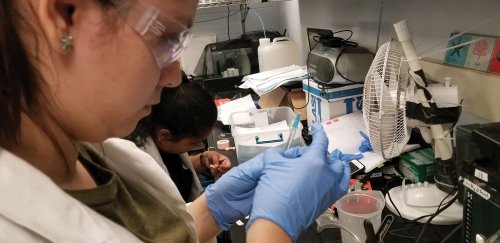
Research in Maia’s lab has focused on fish biomechanics since the summer of 2018.
“The virtual lab is not very glamorous,” said Anabela Maia, assistant professor of biology at Rhode Island College. “We meet over Blackboard Collaborate, share our screens to explain the analysis, check on weekly progress and discuss papers.”
Research in Maia’s lab, located in Fogarty Life Sciences, has focused on fish biomechanics since the summer of 2018. Maia’s team use functional morphology to learn about fish movement as well as the impact of habitat changes. The team’s lab studies are complemented with fieldwork to bridge the gap between biomechanics and ecology.
Before RIC migrated to remote classes, Maia worked in her lab with seven undergraduate students (one pre-nursing and six biology) and 16 specimens (14 bass, one scup and one bluegill). After March 23, the specimens were released back to Narraganset Bay and Lincoln Woods. “We had to release them because it would be very hard to take care of them when everyone is staying at home,” she said.
Although the shift to teaching remotely was abrupt, Maia strives to keep her classes as close to normal as possible with the same routine. She synchronizes with students during lecture time, uses an open lab “room" (a virtual option that allows students to meet and talk more privately online) and students also access the actual lab’s data to conduct analyses.
When the decision to close Maia’s lab in Fogarty was made, she had enough time to grab data and set up computers that the students could access remotely.
“We have asynchronous labs that I prepare for the whole week so they are available for the students,” Maia explained. “Student work in these labs is recorded at Blackboard Collaborate as evidence of student participation. One of the students studies the fins and how the fish moves; so now the student is using video previously captured at the lab and analyzing it.”
Now that everyone has settled into working remotely, Maia is using her lab time to explain new analyses and talk to students about their manuscripts, helping them to organize their data.
“So far, the students feel excited about their research and think that this is a good opportunity to get the data analyze and summit their papers by the summer to actually have a chance to get into graduate school,” she added.
Since the work in Maia’s lab is focused on understanding the fishes’ movement and their habitat, she notes how the isolation brought about by COVID-19 has a great impact on the water in places like Narraganset Bay, changing pollution levels. “Pollution has a strong impact on fish populations, female fish reproduction and water quality, even for human consumption,” she explained.
The situation we are living in now “is a great opportunity for us to understand what we could do with better regulations of pollution,” she said.
Maia believes that although the pandemic has created difficulties for us, this moment in history may actually be good for the environment. “I hope it’s eye opening for the people to realize that there are measures we can do to help our planet that wouldn’t take too much effort if we commit to them.”
“If we can reverse climate change, especially in Narraganset Bay, we can bring back the species that were here before, which could be more economically profitable for fishermen and the fishing economy,” she concluded.
